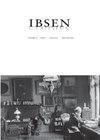Ibsen, Power and the Self: Postsocialist Chinese Experimentations in Stage Performance and Film
IF 0.6
0 THEATER
引用次数: 1
Abstract
I highly recommend Kwok-kan Tam’s excellent monograph, titled Ibsen, Power and the Self: Postsocialist Chinese Experimentations in Stage Performance and Film, as an essential text book for undergraduate classes and graduate seminars in comparative drama, world theatre, Chinese performance culture, and for general readers looking for fascinating stories about how the introduction of Ibsen into China has fundamentally changed the political, ideological and cultural landscapes of its art scenes. This book is an important read for anyone studying art and theatre with or without a non-Western focus. Having published numerous books and articles on Ibsen and modern Chinese drama and cinema, Tam is one of the best scholars to complete this study, which yields a new understanding of the complex relationships between Western traditions and Chinese theatre. Even though its subtitle marks “postsocialist” period as its main focus, Ibsen, Power and the Self exceeds its expectation: this book traced a century of Ibsen’s influence on the formation of modern Chinese culture. Throughout the book, discussions were contextualized around key intellectual figures’ early explorations of modern drama in connection with its ideological function: from Chen Duxiu, who promoted theater to educate the Chinese mind, to Hu Shi, who translated Ibsen’s A Doll’s House and published his famous manifesto on “Chinese Ibsenism” to advocate individualism and woman’s equality, and to Lu Xun, who questioned, in 1923, what would happen to Nora after she had left home without economic opportunities. All three figures represented more than two polarities of Chinese intellectual trends at the time: Chen as the radical socialist who易卜生、权力与自我:后社会主义中国的舞台表演与电影实验
我强烈推荐谭国根的优秀专著《易卜生,权力与自我:舞台表演和电影中的后社会主义中国实验》,作为本科课程和研究生比较戏剧、世界戏剧、中国表演文化研讨会的必读教材,以及寻找易卜生引入中国如何从根本上改变其艺术场景的政治、思想和文化景观的引人入胜的故事的普通读者。这本书对于任何研究艺术和戏剧的人来说都是一本重要的读物,无论他们是否关注非西方。谭咏麟出版了大量关于易卜生与中国现代戏剧和电影的书籍和文章,是完成这项研究的最佳学者之一,对西方传统与中国戏剧之间的复杂关系有了新的认识。尽管《易卜生:权力与自我》的副标题以“后社会主义”时期为主要关注点,但它超出了它的预期:这本书追溯了易卜生对中国现代文化形成的一个世纪的影响。在整本书中,讨论围绕着主要知识分子早期对现代戏剧的探索及其意识形态功能展开:从提倡戏剧教育中国人思想的陈独秀,到翻译易卜生的《玩偶之家》并发表著名的“中国易卜生主义”宣言、倡导个人主义和妇女平等的胡适,再到1923年质疑诺拉离开家后没有经济机会会发生什么事的鲁迅。这三个人都代表了当时中国知识分子趋势的两种以上两极:陈是激进的社会主义者
本文章由计算机程序翻译,如有差异,请以英文原文为准。
求助全文
约1分钟内获得全文
求助全文

 求助内容:
求助内容: 应助结果提醒方式:
应助结果提醒方式:


